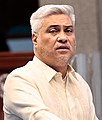
University of the Philippines Los Baños
The University of the Philippines Los Baños (UPLB; Filipino: Unibersidad ng Pilipinas Los Baños), also referred to as UP Los Baños or colloquially as Elbi (pronounced ['ɛlbi]), is a public research university primarily located in the towns of Los Baños and Bay in the province of Laguna, some 65 kilometers southeast of Manila. It traces its roots to the UP College of Agriculture (UPCA), which was founded in 1909 by the American colonial government to promote agricultural education and research in the Philippines. American botanist Edwin Copeland served as its first dean. UPLB was formally established in 1972 following the union of UPCA with four other Los Baños and Diliman-based University of the Philippines (UP) units.
Motto
Honor and Excellence[1]
National, research University
March 6, 1909
(115 years and 116 days)
Jose V. Camacho Jr.
964[2]
12,027 (2019)[3]
8,796 (2019)[3]
2,494 (2019)[3]
737 basic education (2019)[3]
Rural, 15,205 ha (37,570 acres)[4]
"U.P. Naming Mahal" ("U.P. Beloved")
Association of Pacific Rim Universities
ASEAN-European University Network
ASEAN University Network
The university has played an influential role in Asian agriculture and biotechnology due to its pioneering efforts in plant breeding and bioengineering, particularly in the development of high-yielding and pest-resistant crops. In recognition of its work, it was awarded the Ramon Magsaysay Award for International Understanding in 1977. Six of its research units are classified as Centers of Excellence in Research via presidential decree,[5] and it hosts a number of local and international research centers, including the International Rice Research Institute (IRRI), ASEAN Center for Biodiversity, World Agroforestry Centre, and the Southeast Asian Regional Center for Graduate Study and Research in Agriculture (SEARCA).
UPLB offers more than 100 degree programs in various disciplines through its nine colleges and two schools, 29 of which are undergraduate degree programs. As of 2021, nine academic programs were recognized by the Commission on Higher Education as Centers of Excellence while one program was recognized as Center of Development.[6]
UPLB alumni have been recognized in a wide range of fields. They include 16 scientists awarded the title National Scientist of the Philippines,[2] members of the United Nations Intergovernmental Panel on Climate Change,[7] Palanca Award winners,[8][9] as well as political and business leaders.
People associated with the university include alumni, faculty, and honorary degree recipients. They include 16 out of 41 National Scientists of the Philippines: Eduardo A. Quisimbing, 1980 (Plant Taxonomy, Systematics, and Morphology), Francisco M. Fronda, 1983 (Animal Husbandry), Francisco O. Santos, 1983 (Human Nutrition and Agricultural Chemistry), Julian A. Banzon, 1986 (Chemistry), Dioscoro L. Umali, 1986 (Agriculture and Rural Development), Pedro E. Escuro, 1994 (Genetics and Plant Breeding), Dolores A. Ramirez, 1998 (Biochemical Genetics and Cytogenetics), Jose R. Velasco, 1998 (Plant Physiology), Gelia T. Castillo, 1999 (Rural Sociology), Bienvenido O. Juliano, 2000 (Organic Chemistry), Clare R. Baltazar, 2001 (Systematic Entomology), Benito S. Vergara, 2001 (Plant Physiology), Ricardo M. Lantican, 2005 (Plant Breeding), Teodulfo M. Topacio Jr., 2008 (Veterinary Medicine), Ramon C. Barba, 2014 (Horticulture), and Emil Q. Javier, 2019 (Agriculture).[2] Meanwhile, four UPLB scientists are members of the United Nations Intergovernmental Panel on Climate Change that won the Nobel Prize in 2007: Rex Victor Cruz, Felino P. Lansigan, Rodel D. Lasco, and Juan M. Pulhin.[7] Scientist Romulo G. Davide was given a Ramon Magsaysay Award in 2012 for "his steadfast passion in placing the power and discipline of science in the hands of Filipino farmers".[2]
UPLB alumni have served as senior government officials under various administrations. Those currently in office include Senate President Migz Zubiri, House of Representatives Deputy Speaker Isidro Ungab, Socioeconomic Planning Secretary Arsenio Balisacan,[135] and Makati City mayor Abigail Binay. Trade and Industry Secretary Alfredo Pascual was a faculty member prior to his appointment.[136]
Both of its honorary degree recipients held influential roles in their respective countries' politics. They are Salim Ahmed Salim, former Prime Minister of Tanzania,[137] and Sirindhorn, Princess of Thailand.[138]
Former UP presidents Bienvenido Maria Gonzalez (1939–1943; 1945–1951), Emil Q. Javier (1993-1999) and Emerlinda R. Roman (2005-2011) graduated from UPLB,[2] along with the sitting chancellors of UP Baguio, UP Mindanao,[139] and UP Open University.[140] Alumni who held ranking posts at other academic and research institutions include Jikun Huang, Founder and Director of the Center for Chinese Agricultural Policy of the Chinese Academy of Sciences,[141] Kyu-Seong Lee, Director-General of South Korea's Rural Development Administration,[142] and Weerapon Thongma, President of Maejo University in Thailand.[143]
San Miguel Corporation Chairman and CEO Eduardo Cojuangco Jr. and Bounty Agro Ventures President Ronald Daniel Mascariñas also attended UPLB.[144]






